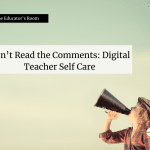Have you signed up for The Educator’s Room Daily Newsletter? Click here and support independent journalism!
The hardest thing about no longer being in education is seeing articles like this: Inside Louisiana’s harshest juvenile lockup. They awaken something in me that is hard to face. These days, I work in EdTech at a company with a great culture, in a job I enjoy. But before I got this job two months ago, I worked in an alternative school for students leaving juvie or being kicked out of other area schools.
When I see an article like this I feel ignited – the same way I felt ignited so many times during my teaching career. I felt ignited when I got the call to interview at that alternative school. And I felt ignited again when I fought to create policies and programs at that campus to provide students better opportunities.
Dreaming of Making a Difference
When I was a teacher I dreamed of pursuing a Ph.D. in educational policy and making a difference on a grand scale. I found rather quickly that my niche in education centered around students who had been involved in the juvenile court system, and the equity issues that arise from their proximity to that system. I often thought about teaching in a juvenile hall building, or to adult prisoners looking to complete their GED. In fact, I started teaching GED at night in my district because I was so passionate about providing education to every single person, regardless of circumstance.
But it wasn’t sustainable. I was not paid well for the work I did at my campus or for my background (including two graduate degrees). Despite how hard it is to hire teachers for an alternative school, there were no extra incentives for working there. We were not paid more or given specialized bonuses like hard-to-fill STEM positions are across the nation. This serves as another example of how we don’t prioritize our most vulnerable educational communities.
Feeling Burnt Out and Stuck
Additionally, as a staff, we were always asking if the school was going to be open next year. Despite the deep need for the specialized service we provided, our positions never felt secure. Meanwhile, I personally did plenty of extra work for the school: establishing a college and career center, creating an orientation course for new students during my summer break, and other short and long-term improvement projects. But as I sacrificed my prep and personal time for these projects, I never received anything other than warm fuzzy feelings for it.
As the feelings of burnout began to creep in, I tried to stay mission-driven but looked for a change of scenery. I hoped all the extra work I had done qualified me for a central office position, so I pursued a role there. I was excited to be able to make a wider impact, but also to get the pay raise I desperately needed. Despite my passion and experience, including previous work with the director who interviewed me, I was not selected. I was told it was due to my lack of experience. I had run myself ragged for three years in a resource-deprived environment to be told I had to do more to earn the chance to move up and progress my pay. During those three years, I was constantly getting messages that I was accelerating my path to a higher-paying and lower-stress position. But that wasn’t true and I couldn’t get a straight answer on what more I should have done.
Side Gigs and Long Hours
At the end of the day, I hate to say that is what really got to me: the pay. I love education, and deeply care about all that teachers do, but our pay is not acceptable. We are not being valued for our time or expertise, or the valuable impact we have on communities. I was arriving at a point in my adult life where my friends in the private sector were starting to get their first big promotions and pay raises. At the same time, I saw my options for progression slip out of reach. The harder I looked at my own opportunities, the less motivated I became. The pay would never match what I was putting in.
To supplement my income, I had also always been working side gigs. I taught summer school, night school, GED classes, wrote and spoke on education issues as a freelancer, and took other stipend opportunities. None of these things made me rich. But they made it easier for me to get by on my teaching salary, as long as I accepted the trade-offs. I remember coming home exhausted at 8:30 pm after nights at the GED classroom, having to go straight to bed so I could wake up at 5 am to be ready to teach in the morning.
Why I Finally Left Teaching
Of course, this all led me toward burnout. With the projects, side gigs, and the increasing dissatisfaction with my regular teaching job (exacerbated by the pandemic and politics), I got to a place where I was done and wanted to get as far away from it all as I could. This was not a decision I took lightly. Though I knew it was the right decision, it is one I still mourn. I would have loved to spend a lifetime in the school system, but the workload, low pay, and lack of advancement opportunities drove me away early.
I wanted to be done at 5 pm and be respected for my work, like so many other professionals. I wanted access to opportunities and an upward trajectory at my job, including the appropriate salary that comes with it. I wanted to contribute to a 401k like everyone else and choose my investments instead of being stuck in a restrictive pension system. I wanted to be able to seek out remote opportunities so I could save time and money on a commute, and have more flexibility in my life.
But when I see articles like the one I shared at the start of this piece, I wonder where I am meant to be. It is a cruel reality that so many of us have to choose between meaningful work serving marginalized communities and being able to support ourselves. I feel selfish and like a sellout all the time for having left teaching. I mourn that decision every day even though I like where I am now. The only way I am able to advocate now is from the sidelines as a writer. Still I dedicate my free time to it, because since I left the classroom it’s the best way to show I still care.
Editor’s Note: If you enjoyed this article, please become a Patreon supporter by clicking here.






